Onwards!
Before we start, though: unfortunately due to Heroku shutting down their free tier, any comments submitted between the beginning of December and when I fixed it last week will have bounced. There is no way to retrieve them, and I’m really sorry if you wrote any long comments. I have switched the comments backend to fly.io, so you should be able to submit comments again now.
This chapter is titled To The Island of the Witch. I assumed it’s the chapter in which Ange goes to Rokkenjima… and it seems I’m right, since the first-person POV on a very familiar boat is not Battler, but Ange. She’s not going to Rokkenjima just yet though. Instead, she’s going to Niijima, which I vaguely recall is the island on the way to Rokkenjima where we first met Kumasawa back in episode 1.
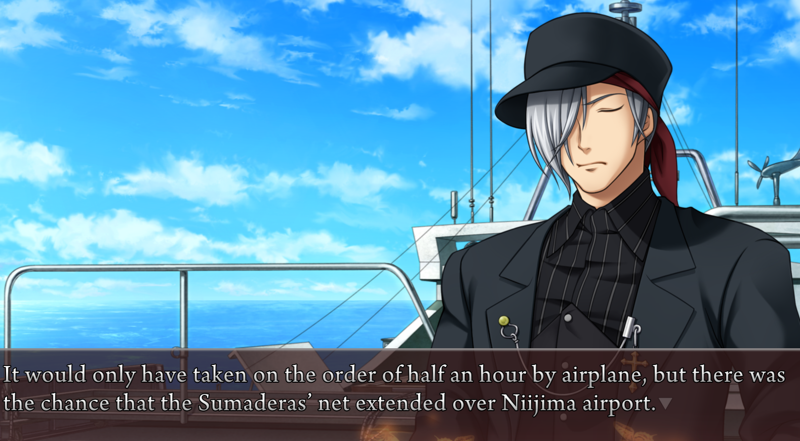
Amakusa is here too. Here’s today’s Japanese grammar tidbit:
Amakusa: まぁ、贅沢は言えねぇですな
Amakusa: Well, beggars can’t be choosers.
The verb he’s using is 贅沢を言う, ‘to ask for too much’. I’m a bit unsure about the verb conjugation, but I think the え is putting us in the potential form again, ねぇ is a accented modification of ない, and then that な at the end is emphasis? If I made a note of Amakusa’s dialect I seem to have forgotten. Blending あい sounds into ええ is apparently a tōkyōben thing (mentioned in the WP article on kansaiben), but I don’t know much more than that.
OK, let’s not get lost on that tangent. It’s good to practice though!
They discuss Maria’s diary. Ange says she doesn’t think she’ll learn much more than a ‘fairytale’ from it. So it’s time to interview some locals. Carmen Sandiego won’t escape this time!
Ange is pretty outwardly dismissive of the idea that she’ll be able to find out anything new, speaking of it as if it’s just an indulgence, satisfying her own sense of having investigated (she uses the word 自己満足, self-satisfaction). Privately, though, she can’t let go of her vision of Bernkastel, and the promise that this might somehow lead to saving her family. It seems that, much as narrative!Battler has no knowledge of meta!Battler, the same is true of narrative!Ange and meta!Ange.
That said, there is something important here: it’s not just meta!Ange who experienced a meeting with Bernkastel. If Ange’s narrative is the ‘real’ world, Bernkastel can be said to ‘exist’ in it, if only as a figment of Ange’s imagination! That seems significant.
Amakusa replies approvingly, saying that self-satisfaction is all it’s really about in the end. This prompts philosphical musing from Ange.
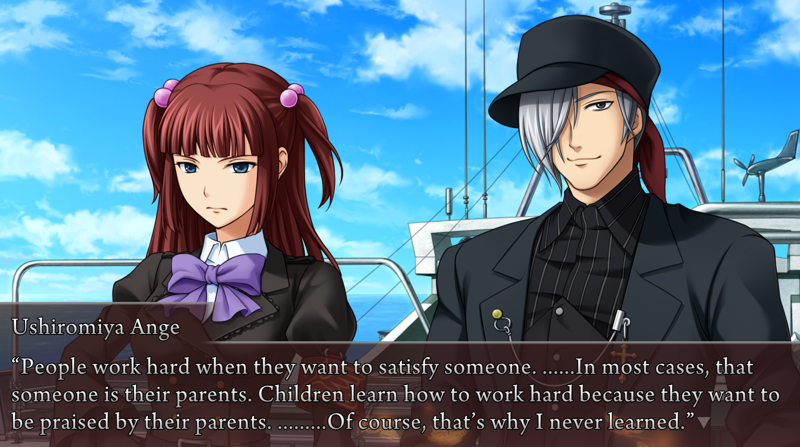
I think Ange is on to something here. I have been thinking occasionally about Nagisa Ōshima’s quote about why salarymen work so late…
To Oshima, a gay Shinsengumi is natural, since homosexuality is rooted in Japanese male aesthetics. “Why do you think the Japanese businessman stays in the office for so long? Don’t tell me it’s out of loyalty to the company. He’s there because consciously or unconsciously, he wants to be with other men.”
“Don’t tell me it’s out of loyalty to the company.” especially. Sometimes when I look at security guards in shops, I think, what is their actual motivation to stop someone shoplifting? Fundamentally the relationship between employer and employee is adversarial; the employee gets paid if they put the convincing appearance of work, orthogonal to actual work. So for someone to actually work hard, they need some other motivation than pay.
In school I was a ‘good’ student who valued academic achievement. This earned me considerable praise from teachers and often hostility from peers. I suppose autistic-child Bryn must have judged the former easier to attain than the latter.
Damn I’m full of tangents today. Returning to the story… Amakusa counsels prioritising your own satisfaction and disregarding praise from others. That’s really the rub isn’t it?
Amakusa: The anguish of the human world comes when you want to satisfy someone, you want recognition, but you don’t know where to put the effort. I had a time like that too.
I wanted recognition, but I didn’t know what I wanted recognition for. And since I didn’t know what I was meant to put effort into, or even who I wanted to give me that recognition, I did a lot of crazy things.
Man, tell me about it. Amakusa says: only you get to define meaning and worth for your life. Mmhmm. Quite so.
Exit Amakusa; enter Mammon. She naturally says greed, not self-satisfaction, is what life is about. Ange replies that for humans to live that way, it will ensure you die with regrets.
Following this train of thought, Ange arrives at the conclusion that the easiest way to be satisfied in life is to seek nothing. Quite a Buddhist conclusion. Mammon runs with this…
Mammon: If so, then humans live only so that they can have a satisfying death. They live so that they can have a better death. They live to die.
She asks Ange what it means to make a human complete. Ange suggests validation, acceptance and happiness—but it’s not always clear whose acceptance is needed.
They discuss the phrase ‘Rich is the one who is content with what they are’. This appears to be an established phrase in Japanese, although there are similar quotes in English.
吾唯足るを知る
I’m unable to verify the source though.
This conversation about self-acceptance leads to Ange thinking about Maria. To Ange, Maria basically speedrunned that journey of self-acceptance. (Or rather perhaps she was forced to do that by Rosa to survive.) Even though Rosa didn’t love her, Maria was able to essentially simulate it.
I’m not sure I buy that this enthusiasm for solipsism is the answer though. Maria was able to maintain a narrative that she’s happy… but as we saw in the scene with Sakutarō in the previous chapter, she couldn’t keep that up indefinitely.
In any case, this leads Ange to conclude that her actions in Chapter 8 were cruel to Maria and the various furniture. She concludes that whether magic exists is a personal truth, not an absolute one, and she had no right to gainsay. Hmm. She remembers ‘when I was young, I said it, on that day’—does she mean the time she was in school and she rejected the Maria of the diary, or when she was much younger and rejected magic in person? Looks like the latter.
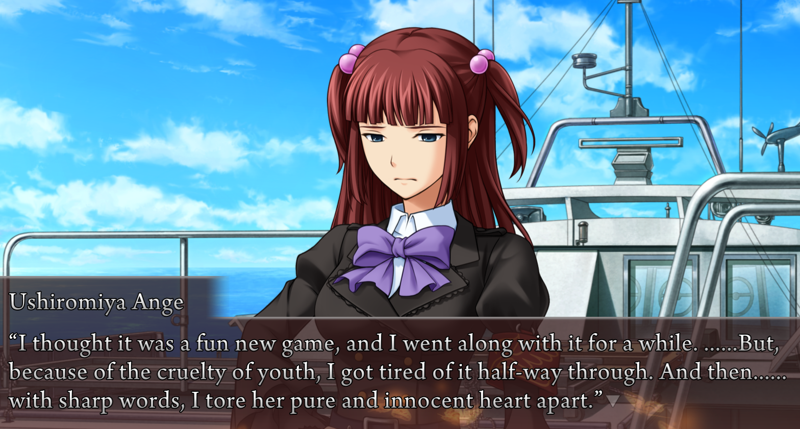
Ange starts crying recalling this. Do you know, I still feel guilty occasionally for stealing another child’s pokémon cards? I don’t even remember how old I was. It’s interesting that Ange is at once mobilising the cruelty of youth and the innocent child.
Ange observes that the first article of Mariage Sorcière is that witches must accept and respect each other. Maria hadn’t yet reached the sort of sanguine view that Ange suggests, and needed to propose a witches’ alliance.
She shifts to the other big rejection, when she rejected the Sisters of Purgatory. Mammon retorts:
Mammon: I’m offended. We accept that we exist ourselves. We’re not like humans, with their souls half-asleep. ……‘I think, therefore I am.’
If you’re wondering: Descartes’ famous line in Japanese is 我思う故に我あり.
It’s interesting that Mammon invokes her own subjectivity as proof of her existence. Since after all as a tulpa, that’s the thing that humans regard as most in doubt. We end up at the famous P-zombie or ‘Chinese Room’ problem, where there’s no way you can really prove you have subjective experience to a sceptical observer’s satisfaction.
Back in the story, Ange concludes the purpose of the journey is not really to discover what really happened, but an apology to Maria for what happened on that day. She even somehow concludes that hurting Maria as she did as a child somehow led to the Rokkenjima Incident. Uh, hmm. I totally get feeling super guilty for blithely hurting someone, but that’s taking it a little far isn’t it Ange..?
Ange’s logic is basically magical. The connection is Mariage Sorcière; that’s about as far as it goes.
Mammon has a funny answer.
Mammon: Hmmmm…… The Japanese sure are interesting. Even if they’re the victim, they feel as though they did something wrong, and apologise for no reason.
If I ever move to Japan, I’ll have that part covered.
Wanting to leave something for Maria when she gets to Rokkenjima, Ange starts performing a little magic. She calls up… Sakutarō! He aten’t dead after all! (But then he survived getting killed by Rosa, so.)
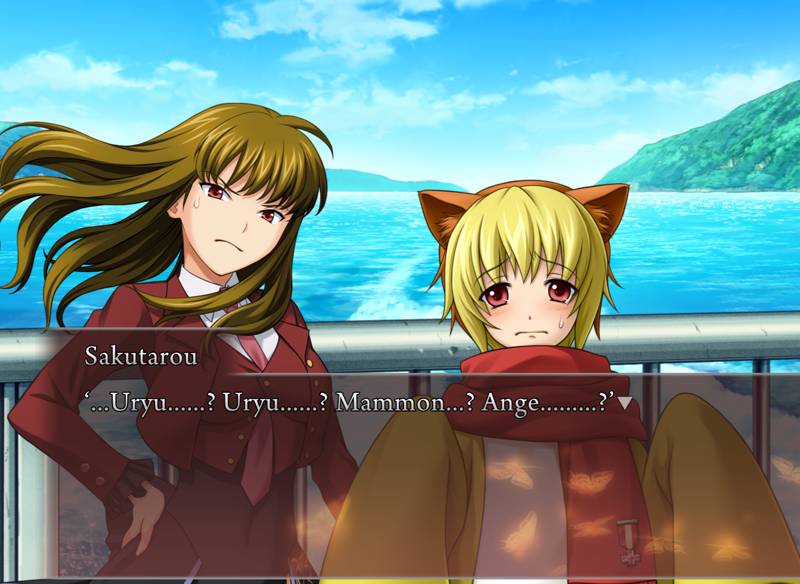
Ange makes her apology, and summons all the other Seven Sisters as well. The thing about this apology is… it can’t be rejected by the ‘furniture’. They ‘exist’ purely at Ange’s disposal. We have to engage in an interesting juggling game of dialethism here.
Anyway, Lucifer raises the point that summoning witch furniture seems contrary to the spirit of opposing Beatrice in the game. (Hmm, so I guess there is some connection between meta!Ange and narrative!Ange? I suppose I am being way too literal with the two ‘worlds’.) Ange’s answer is that she has committed to this relativist view on the question of magic:
Ange: Because magic exists for people who believe. Even if I don’t. If someone believes, then magic will exist in that person’s world.
That will not be interfered with in any way, whether I believe in magic or not. No, it must not be interfered with.
“That’s quite the rationalization”, says Satan. Lol, thanks Satan. Anyway, Ange declares that through the power of respect and acceptance, she might be able to understand what’s going on with Maria and Beatrice. As she puts it, ‘the depths of their magic’. And this is sufficient for the anti-magic toxin to disappear…
In a materialist interpretation, we could say that what Ange has done is decide she is willing to entertain the idea of magic if it will help her understand another person. I’m not sure how literally we should read these scenes of summoning and conversing with demons. Would we say these are things that Ange is imagining doing, ‘doing the voices’ as Maria did, or is it a metaphorical depiction of how she is entertaining the idea of magic now? ‘Mu’ I guess.
The Sisters remark that Ange is full of magical potential, potentially to rival Beatrice. But instead she’s out to slay witches instead.
As she puts it, though witches might exist somewhere, in her world they do not. So Ange is not out to prove the impossibility of witches anywhere, just rule out the existence of one on Rokkenjima.
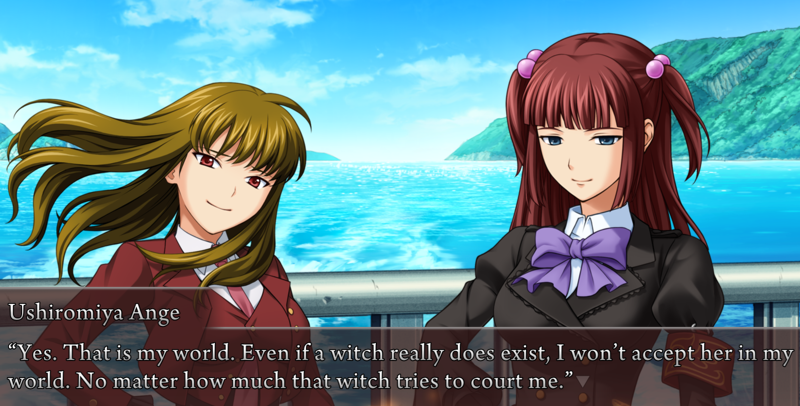
Courting you say..?
The Seven Sisters have been left ‘room to exist’, but only as ‘someone to talk to’.
Ange comes to question why Maria wasn’t able to summon Sakutarō again after his stuff-animal ‘vessel’ was torn by Rosa. After all, she doesn’t need the vessel to summon him here. Sakutarō’s answer is:
Sakutarō …That’s because…at that time, Maria saw my stuffed animal get torn, and she decided that I had died.
Ange describes the shock as a wound in Maria’s heart. The word ‘trauma’, incidentally, originally referred to a physical injury before being eclipsed by the notion of psychological trauma. Just noting that. For the metaphor fans out there.
In Maria’s diary, after Sakutarō’s death, the magic she’d write about took on a darker tone, curses etc. Maria’s soul died ‘unfulfilled’. Ange runs with the idea:
…..I wonder if her unfulfilled soul has a hole opened in its chest from sadness even now, and continually wanders, tears dripping down and calling Sakutarō’s name……
Ange’s plan becomes clear. She wishes to ‘revive Sakutarō in Maria’s world’. This could be achieved by having Rosa recreate Sakutarō’s vessel… but awkwardly both she and Maria are dead. But Ange remains resolutely convinced that she will somehow be reunited with Maria on the island, and she can grant Sakutarō.
All this musing has brought them a lot closer to their destination. Ange goes below decks and observes Amakusa is armed. He brings up an aphorism, that weapons should be heavy since a human life is heavier than the Earth. Quite the warrior poet, this guy.
Of course, Kasumi also comes to the island. She flies in to the airport then drives, announcing a plan to intercept Ange on the deserted Rokkenjima. They’re also armed. Guess we can expect an entire gun battle to spice up the Ange chapter soon!
The next chapter is titled Ushiromiya Kinzo. Now that’s a title that promises some kind of major revelations, huh?
Not a lot to say about this chapter that I haven’t said in previous ones. Ange committing fully to alethic relativism is an interesting angle. I look forward to seeing how that plays out in the three-way game to come!
Maybe we should ask—is it possible that anyone survived the Rokkenjima incident? We from the episode 1 end scroll that some of the Ushiromiya children were identified by fragments of bone. We don’t necessarily know the condition that the other bodies were found in, just that the only known survivor is Eva and the rest are confidently considered dead by everyone. But it’s a large island with at least a couple of concealed structures. Kuwadorian seems to have been discovered, but what of the underground facility where the gold was hidden? Is it possible someone hid down there until the heat was gone and then left? Or even stayed there? Right now we have no proof one way or another.
Such a hypothetical survivor would probably not be one of the Ushiromiyas, since they’d have reason to contact Ange, but what about the servants? Suppose Eva had dunnit, or at least dun some of it. If someone survived, Eva would have every reason to kill them too, to cover up her murders. Without the resources to pay for expensive bodyguards from Blackwater, that person would have no choice (or at least, might think they have no choice) but to go to ground.
I suppose all will be answered before too long once Ange gets to the island. In the meantime… Kinzo.
There are many mysteries surrounding Kinzo right now. Whether he’s already dead, for one! Another is what his relationship to ‘Beatrice’ really was. But the main one I’m hoping we’ll learn right now is where he grew up, since that seems pertinent to the solution of the riddle. Maybe we’re about to find that out! See you soon with……answers?
Comments